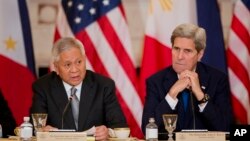Top U.S. officials reaffirmed Washington's "ironclad" security commitment to Manila on Tuesday, applauding a ruling by the Philippine Supreme Court to uphold a bilateral defense agreement with the U.S., which could strengthen maritime security cooperation.
"We welcome the Philippine Supreme Court's decision that the Enhanced Defense Cooperation Agreement is consistent with the Philippine constitution," said U.S. Secretary of State John Kerry. "We look forward to implementing this accord, which will increase the interoperability of our armed forces and contribute to modernization and improve our joint capacity to respond to humanitarian emergencies."
Kerry and Defense Secretary Ash Carter met with Filipino Secretary of Foreign Affairs Albert del Rosario and Defense Secretary Voltaire Gazmin in Washington for the second so-called "two-plus-two" talks on revitalizing the alliance between the two countries.
"For us, that means very soon — and we're working on this right now — deciding together how we want to use that opportunity to strengthen our maritime security capabilities and our role in keeping a peaceful region, a region without divisions and without tensions, and a region where everyone has freedom to carry out their affairs, including commerce, in their own way," Carter said.
South China Sea tensions
The first U.S.-Philippines defense and foreign affairs ministerial talks were held in 2012.
The bilateral U.S.-Philippines Enhanced Defense Cooperation Agreement was signed in 2014, but faced legal challenges from groups opposing a U.S. military presence.
The Philippine High Court's ruling will bolster U.S. efforts to reassert its presence in Asia. Rosario said the ruling "opens up new opportunities to further deepen this enduring alliance."
It comes at a time of heightened tensions in the South China Sea. Recent Chinese test flights on Fiery Cross Reef have drawn protests from countries including the Philippines.
"There are many aspects to that security cooperation and that joint umbrella, if you like,” Carter said. “One of those is freedom of navigation and freedom of the commons. The United States has indicated our intention to fly, sail and operate wherever international law allows, whether it be the South China Sea or anywhere else around the world."





